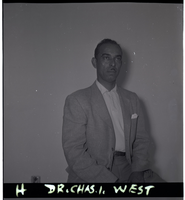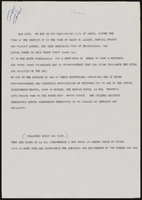Search the Special Collections and Archives Portal
Search Results
Paris, France Show Programs Collection
Identifier
Abstract
The Paris, France Show Programs Collection (1950-2000) is comprised of publicity print materials of the following cabaret music halls and burlesque clubs in Paris, France: Alcazar de Paris, Casino de Paris, Folies-Bergère, Le Lido de Paris, and Moulin Rouge Paris. The collection includes programs, advertising posters, fliers, long playing record albums, photograph slides, and restaurant menus. This material was formerly known as the International Show Programs Collection.
Archival Collection

Transcript of interview with William H. Bailey by Betty Rosenthal, March 16, 1978
Date
Archival Collection
Description
Interview with William H. Bailey conducted by Betty Rosenthal on March 16, 1978. Arriving in Las Vegas in 1955, Bailey became an assistant producer and master of ceremonies in the first interracial hotel in Nevada, the Moulin Rouge, and subsequently worked in radio and television. Bailey reflects on the history of discrimination in Las Vegas and its impact on the entertainment industry. Bailey's wife Anna was the first black girl dancer on the Strip in the 1961 production, "Nymphs of the Nile." Appointed by Governor Grant Sawyer to the Nevada State Equal Rights Investigatory Commission in 1961, Bailey served as its chairman and traveled throughout the state holding hearings. He describes his work on the commission and how discrimination in housing personally affected him.
Text


Transcript of interview with Jerry Engel by Barbara Tabach, March 1, 2016
Date
Archival Collection
Description
Jerry Engel was born in 1930 in New Jersey and spent most of his early life in Long Beach, New York until the family moved westward to Las Angeles. Jerry is a retired Certified Public Accountant and loves to talk about the history of Las Vegas that he observed since arriving in 1953. That was the year that he moved to Las Vegas to join his older brothers, Morris and Phil, in their accounting firm. Their major client at the time was Desert Inn. Another personal connection with local history: the Engel brothers? mother, Esther Katz Engel, was among the early investors in the Moulin Rouge hotel/casino enterprise. Jerry graduated with honors from University of California, Los Angeles in 1951. His accounting career in Las Vegas is highly regarded and he continues to maintain a consulting practice. He remains active within the community and enjoys doing presentations based on his memories of Las Vegas history. Within this interview, Jerry highlights people, casinos and other observations of local history that he came into contact with over the decades. He provides insights about the role of an accountant in the gaming industry. He also discusses the influence of Jewish business leaders in and array of local gaming and non-gaming issues, including the retail world, Jim Crow era segregation, and the astonishing growth of the valley over six decades.
Text
Anna Bailey oral history interview
Identifier
Abstract
Oral history interview with Anna Bailey conducted by Claytee White on March 03, 1997 for the Women's Research Institute of Nevada (WRIN) Las Vegas Women Oral History Project. Bailey opens her interview by describing her early life, family, and dance training. She discusses moving to Los Angeles, California at age fifteen, her first dancing gigs, and touring in London, England. She also talks about her experiences as an African American dancer including issues with segregation while touring in the southern United States. Bailey then discusses her life in Las Vegas, Nevada in the 1950s, and working as a dancer at the Moulin Rouge. She describes the club, the other dancers that performed there, and how the African American community felt when the club closed. Bailey then discusses how her husband and the entertainers Josephine Baker and Frank Sinatra helped integrate Las Vegas. She ends her interview by describing the last hotel she danced at, the Flamingo, where she performed in an integrated dance line.
Archival Collection

Film negative portraits of Dr. Charles I. West, May 20, 1955
Date
Description
Series of three black and white negative portraits of Moulin Rouge physician, Dr. Charles I. West, dated May 20, 1955.
Image




